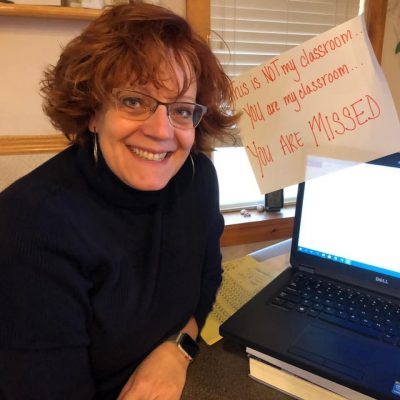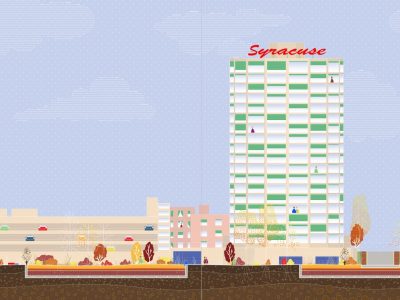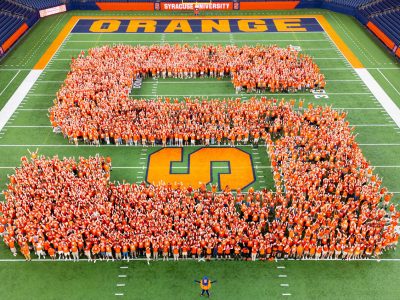Tyna Meeks-Siptrott ’15 Retires After 28 Years of Transformative Teaching
Tyna Meeks-Siptrott, Ph.D., has dedicated 28 years to teaching, leaving an indelible mark on her students and colleagues at Indian River High School in Upstate New York. Her relationship with the University began with Syracuse University Project Advance (SUPA) and continued as an alumna through her ongoing involvement with the program. Throughout her career, Meeks-Siptrott has exemplified a profound commitment to education, innovation and student engagement.
Collaboration with SUPA
Meeks-Siptrott’s involvement with SUPA began early in her teaching career. “I remember my very first year as a newly hired teacher at Indian River and a little postcard was in my mailbox that said, ‘Have you considered teaching college courses?’” she says. She immediately contacted SUPA and trained to teach SU chemistry that summer. “I have been teaching SU chemistry for 27 years,” she says.
A few years later, Professor Jim Spencer, the faculty liaison for SU chemistry, asked if she would be interested in being a part of the pilot program for Forensic Science. Meeks-Siptrott eagerly took on her second SU chemistry course.
Early Research and Shift to Science Education
Meeks-Siptrott began her research journey with summer programs at SU, working on projects such as creating a coating to prevent rust on Humvees and designing a thin film to detect antibiotics in milk. Reflecting on her early experiences, she says, “There was always this piece of me that liked to play and liked to answer questions.”
Driven by her passion for chemistry, and with support from Spencer, Meeks-Siptrott decided to pursue a Ph.D. Initially focusing on chemistry, Meeks-Siptrott had a defining moment that changed her path. Spencer asked her to step in and deliver a lecture to his campus class. A student approached Meeks-Siptrott afterward saying she got so much out of the class that she wanted to take any class Meeks-Siptrott taught. At this point, Meeks-Siptrott realized her true calling was science education. With Spencer’s support, a unique approach merging education and scientific inquiry was approved and Meeks-Siptrott transitioned to a Ph.D. in science education, conducting innovative research directly in a science classroom.
“Tyna has a unique gift to quickly make a deep connection with her students,” Spencer says. “I believe this arises from her own lifelong pursuit of learning and understanding of science. She is a truly outstanding and dedicated researcher, inspirational teacher, thoughtful colleague and true friend.”
Innovative Approaches in Forensic Science Education
Meeks-Siptrott and Spencer developed active learning lessons (ALS) to engage students in large lecture halls, a novel approach for forensic science education. These lessons aimed to better engage students and improve their learning outcomes. “Together Jim and I wrote 15 of these active learning lessons that we hoped would better engage the students in a large lecture hall,” Meeks-Siptrott says.
The research found that active learning had varied impacts based on gender and ethnicity. “Asian males actually did worse in an active learning environment, and based on what we could glean from some of the additional research that I had done, it’s because they don’t trust anybody but the actual professor,” she says. In contrast, “An African American female was not only like more likely to get eight to nine points higher on every exam but would almost pull an alpha roll and would end up not just guiding her own learning but guiding everybody else’s learning that worked with her.”
Inventive Teaching and Impact on Students
Meeks-Siptrott’ teaching approach is characterized by creativity and a willingness to experiment. One of her more memorable initiatives included a forensic science project that provided students with a hands-on, interactive experience in collecting evidence. This approach not only engaged students but also fostered a deeper understanding of forensic science.
Her influence extends beyond the classroom, affecting the academic and career paths of many students. “Several students have gone into neuroscience, pre-med, and other scientific fields,” she says. A former student, Deanna Chavez, who is now working in media, contacted Meeks-Siptrott many years after graduating. She tells Meeks-Siptrott, “I remember my forensics class I took with you, and we need somebody who’s willing to talk about their perception of police and investigations and evidence.”
Meeks-Siptrott’ teaching philosophy centers on fostering a love for learning and creating a supportive, engaging environment for her students. She believes in being adaptable, open to new ideas, and the value of learning alongside her students. “If that means that you’re learning together, that’s okay because they love to see you in that scenario where you say, ‘Look, we’re going to do this together and it might not work out the first time, but that’s okay because we’re going to learn this together.’”
Advice for Future Educators
For those considering a career in teaching, Meeks-Siptrott offers sage advice: “No fear. You’re doing this because you love the students, and you want to bring them something new. So, no fear. It’s new. It’s going to be new to you, but it’s new to them too.” Her encouragement to embrace challenges and think creatively has undoubtedly shaped the careers of many educators.
A Joyful Farewell
As Meeks-Siptrott prepares for retirement, she looks back on her decades-long career with joy and a sense of accomplishment. “I always said that I would know when I was ready to leave. I want to depart with the same joy with which I began,” she says. Her tenure at Indian River High School and SUPA is distinguished by her passion, innovation, and steadfast dedication to her students. Her alumna connection to Syracuse University, of course, will continue forever.


